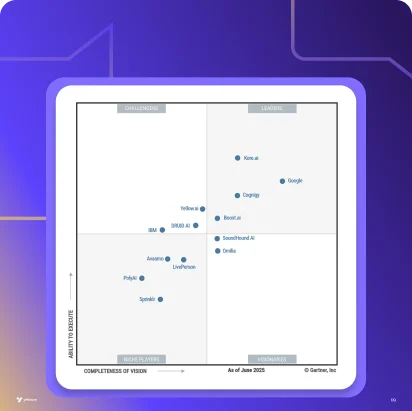Introduction
AI agents have transformed how businesses operate, bringing intelligence and automation to everything from customer service to process optimization. These systems continue to grow more sophisticated, handling complex tasks and making data-driven decisions that drive business value.
Now, a new capability is emerging: agentic AI. It builds upon the strengths of AI agents by adding autonomous reasoning and strategic decision-making capabilities. Agentic AI enhances AI agents in two key ways. First, it adds the ability to understand broader business context and independently work toward objectives. Second, it maintains the reliable execution and specialized expertise that makes current AI agents invaluable.
In this guide, we explore how agentic AI works, what makes it unique, and how it complements existing AI capabilities to create even more powerful enterprise solutions. Whether you’re already using AI agents or just starting to explore AI’s possibilities, understanding this evolution will help you prepare for the next wave of enterprise intelligence.
What is Agentic AI?
The word that best describes agentic AI is autonomy – true, intelligent autonomy that goes beyond following predefined rules.
Agentic AI is redefining enterprise intelligence, advancing beyond basic automation to systems capable of strategic thinking and autonomous action. While traditional AI shines in handling specific, predefined tasks, Agentic AI demonstrates sophisticated reasoning and decision-making abilities, poised to revolutionize business operations.
Definition of Agentic AI: Agentic AI is an advanced form of artificial intelligence that combines autonomous decision-making with sophisticated reasoning capabilities, enabling it to independently plan, execute, and optimize complex business processes without constant human oversight.
The key distinction lies in its ability to manage complex, multi-step challenges independently. Consider the example of global supply chain operations. Traditional AI agents might detect disruptions and suggest predefined solutions, but they still require human intervention at every critical step.
Whereas, Agentic AI, can autonomously:
- Assess real-time inventory levels across multiple warehouses while simultaneously monitoring global shipping delays and costs
- Evaluate the financial impact of each potential solution by analyzing historical data and current market conditions
- Autonomously initiate communications with alternate suppliers to get pricing and availability
- Dynamically adjust manufacturing schedules to optimize resource utilization
- Create and execute a coordinated plan that balances cost, time, and business impact
- Continuously monitor the implementation and refine the strategy based on results
This autonomous chain of reasoning and action represents a significant advancement over traditional AI systems that rely on predefined rules and human intervention at each decision point.

Key Characteristics of Agentic AI
Agentic AI is distinguished by four fundamental characteristics that set it apart from traditional AI systems:
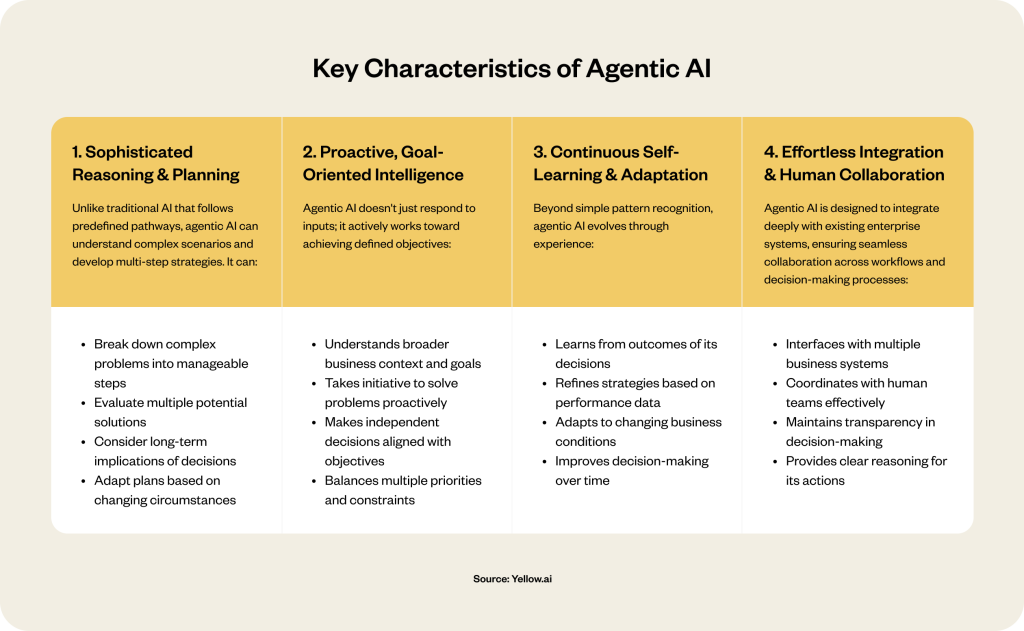
Understanding The Agentic AI Architecture
To truly appreciate how agentic AI achieves its remarkable capabilities, we need to look under the hood at its sophisticated architecture. Unlike traditional AI systems that operate on simple input-output mechanisms, agentic AI’s architecture enables it to think, reason, and act with unprecedented autonomy.
Core Components of Agentic AI
At the heart of every agentic AI system lies three interconnected components that work in harmony. The Cognitive Engine, powered by Large Language Models, serves as the system’s brain, processing complex information and generating sophisticated reasoning strategies. This is complemented by an Action Framework that transforms these decisions into real-world actions, interfacing seamlessly with various business systems and tools. The third crucial component is the Learning Module, which continuously analyzes performance and refines strategies, ensuring the system evolves and improves over time.
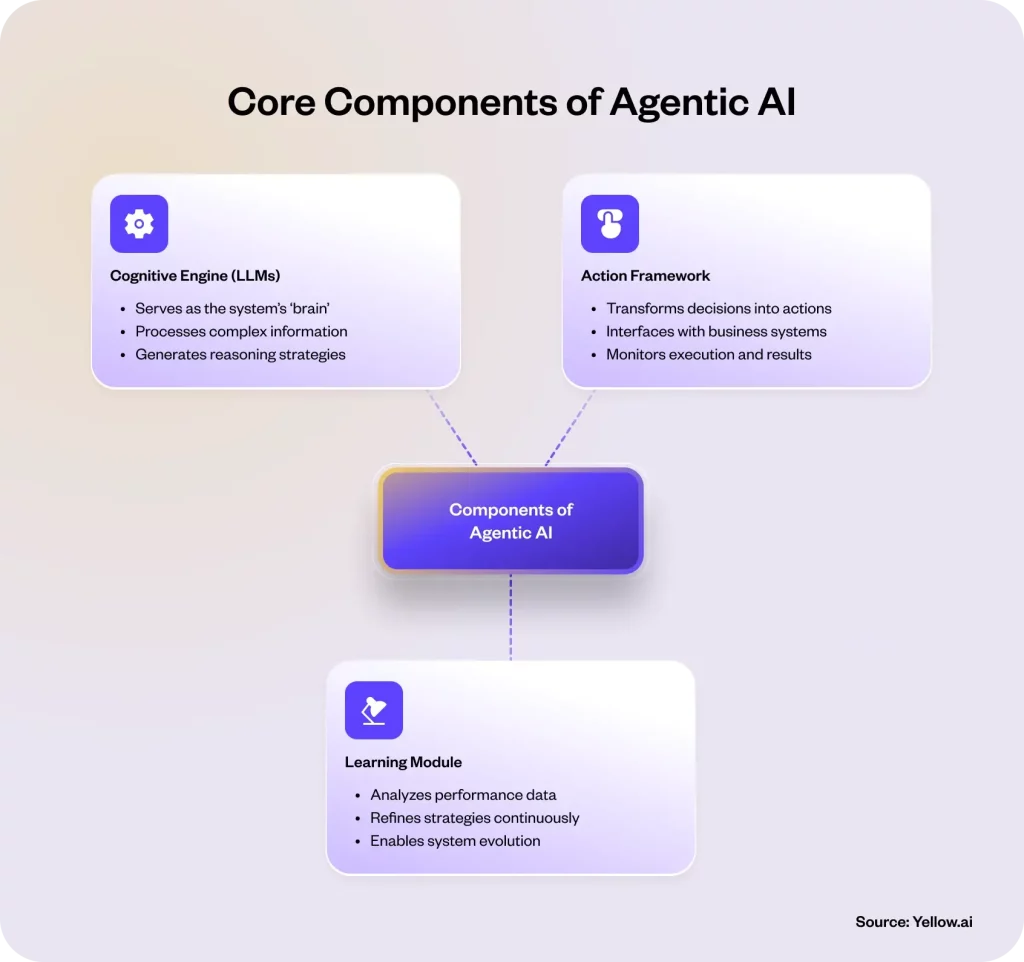
The Four-Step Process: How Agentic AI Works
Agentic AI mirrors human intelligence by following a dynamic four-step cycle that enables it to perceive, reason, act, and learn autonomously. This four-step framework drives its ability to adapt to complex challenges and deliver strategic outcomes:
1. Sense
Agentic AI begins by collecting and processing information from diverse sources to form a comprehensive understanding of the current scenario.
Example: Monitoring real-time inventory, analyzing customer interactions, or assessing market trends.
2. Reason
Building on AI agents’ domain expertise, agentic AI expands intelligence to evaluate its options and determines the optimal course of action by:
- Analyzing available data and potential solutions.
- Anticipating outcomes and weighing risks.
- Aligning actions with business goals and constraints.
Example: Balancing shipping costs and delivery timelines to optimize logistics strategies.
3. Action
Once a strategy is chosen, the system seamlessly transitions to execution:
- Implementing decisions autonomously.
- Monitoring progress and ensuring alignment with objectives.
Example: Initiating supplier communications or adjusting operational workflows in real time.
4. Learning
While AI agents excel at learning within their domains, agentic AI extends this through cross-domain continuous feedback loop where it:
- Evaluates results against expectations.
- Updates its knowledge base for better future decisions.
- Adapts strategies to changing conditions.
Example: Refining procurement strategies based on supplier performance and market shifts.
Agentic AI vs AI Agents
While AI agents continue to deliver tremendous value in today’s enterprise operations, agentic AI represents an exciting evolution in AI capabilities. This evolution builds upon the proven success of AI agents, expanding how AI systems think, learn, and operate.
While traditional AI agents are primarily reactive, responding to queries as they come, agentic AI takes a proactive and strategic approach by anticipating needs, analyzing contexts, and driving outcomes independently.
AI Agents: The Foundation
Today’s AI agents are sophisticated systems that have revolutionized business operations. They excel at processing complex tasks, making data-driven decisions, and delivering consistent results across various business functions. These foundational capabilities provide essential business value through:
- Require human intervention for exceptions
- They follow predefined rules and workflows
- React to specific triggers or inputs
- Operate within specialized domains
The Agentic AI Difference: A Quantum Leap Forward
The transition from traditional AI agents to agentic AI represents a fundamental shift across four critical dimensions:
1. Decision-Making Approach
While AI agents are proficient at making decisions within their trained domains, agentic AI takes a more comprehensive approach. Where an AI agent platform might process customer feedback based on learned patterns, agentic AI can simultaneously analyze customer sentiment, market trends, and operational constraints to make strategic decisions that consider the broader business context.
2. Problem-Solving Capabilities
AI agents excel within their specialized domains, like processing insurance claims or optimizing delivery routes. However, agentic AI transcends these boundaries by developing comprehensive solutions that span multiple domains. For instance, while an AI agent might optimize warehouse operations, agentic AI could orchestrate the entire supply chain, adapting strategies based on real-time changes in demand, logistics, and market conditions.
3. Learning and Adaptation
The learning capabilities of AI agents, while sophisticated, typically require structured approaches and new training data to evolve. In contrast, agentic AI demonstrates a more dynamic learning process, continuously adapting through each interaction and applying insights across different contexts. This enables it to handle novel situations and improve its decision-making capabilities autonomously.
4. System Integration
Perhaps the most striking difference lies in how these systems integrate with existing enterprise infrastructure. While AI agents operate within defined workflows and specific systems, agentic AI can orchestrate multiple systems seamlessly, creating and modifying workflows as needed. This enables a truly holistic approach to enterprise automation, where complex processes can be coordinated across different departments and systems.
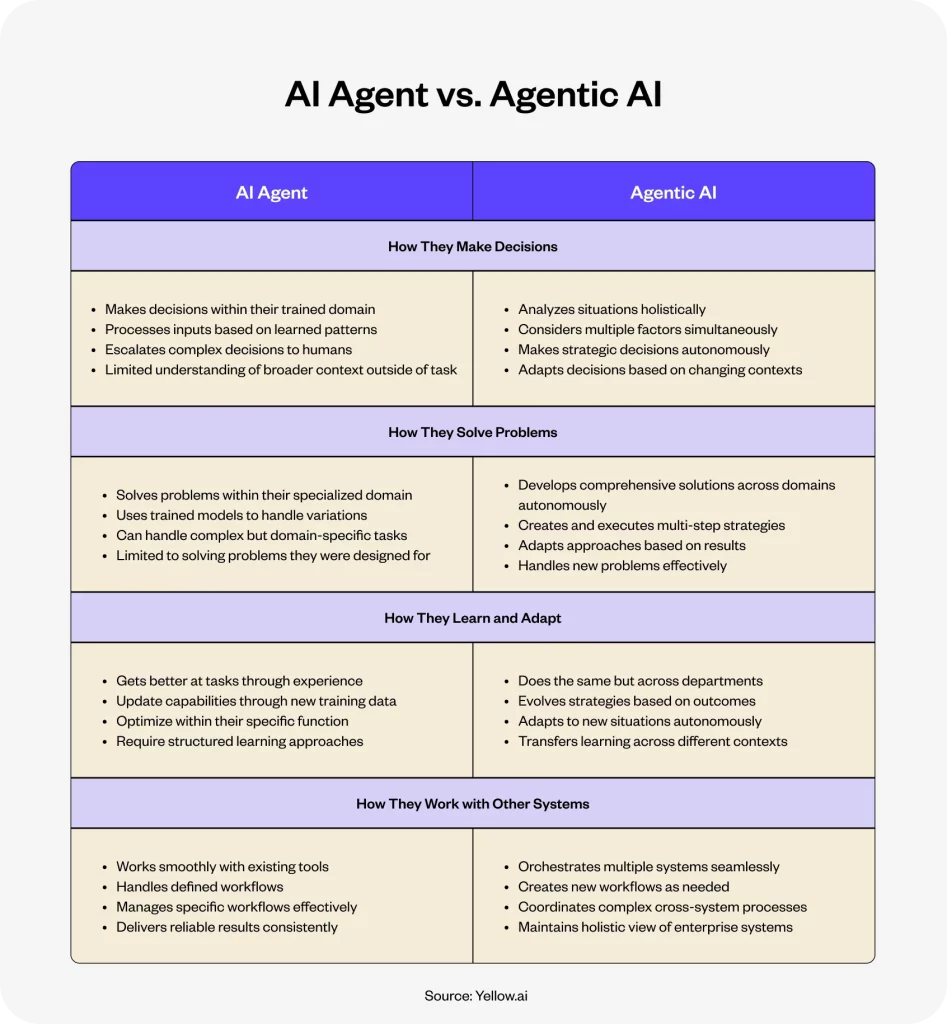
Enterprise Applications & Use Cases
While agentic AI is still emerging, its potential to transform customer service and experience management is particularly compelling. Let’s explore how this technology could revolutionize how businesses interact with and serve their customers.
New Era of Customer Service
The leap from current AI-powered customer service to agentic AI represents a shift from reactive problem-solving to proactive customer experience management.
Real-World Impact Scenario
Consider a complex customer situation: A customer reports an issue with a recently purchased product that involves multiple departments – billing, technical support, and product delivery.
How an AI Agent Excel Today:
- Efficiently processes and categorizes complex issues with high accuracy
- Leverages sophisticated expertise to resolve domain-specific problems effectively
- Seamlessly coordinates across multiple systems and departments
- Maintains clear communication and delivers consistent customer experiences
- Drives significant operational efficiency and customer satisfaction
How Agentic AI will Complement and Enhance These Capabilities:
1. Comprehensive Analysis (Future Potential)
- Will be capable of analyzing complete customer history holistically
- Expected to identify patterns across similar past cases
- Designed to evaluate potential impact on customer lifetime value
- Will consider multiple resolution paths autonomously
2. Strategic Resolution (Planned capabilities)
- Aims to develop AI-driven multi-step resolution plans
- Will coordinate seamlessly across departments
- Expected to enable proactive communication
- Plans to monitor resolution progress in real-time
3. Long-Term Value Creation (Vision)
- Intended to identify opportunities for customer growth
- Will be designed to suggest personalized solutions
- Expected to create intelligent engagement strategies
- Aims to generate actionable insights for service improvement
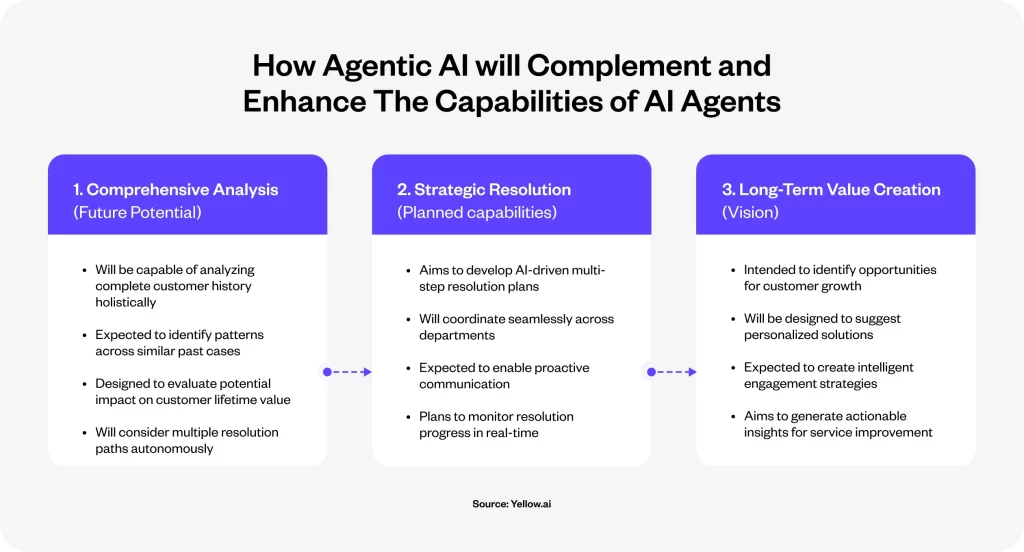
This approach will transform customer service from a reactive, issue-resolution function to a proactive, value-creation engine for the business.
Conclusion
“Agentic AI gives AI new levels of agency (the ability to select what actions to take for achieving particular outcomes). It’ll provide a significant opportunity for performance gains that will increase over time as the systems evolve to more effectively achieve their goals.”
–Top Strategic Technology Trends for 2025: Agentic AI, Gartner
Gartner’s analysis points to something remarkable: AI systems that can truly think and act for themselves. This isn’t just automation or smarter algorithms. It’s AI systems that can understand your business objectives, devise strategies to achieve them, and adapt its approach based on the results – and all of this autonomously. While today’s AI agents excel at their designated tasks and are delivering exceptional value to business operations across industries, Agentic AI will complement these capabilities, working alongside both AI agents and human teams to create an even more powerful ecosystem for driving business outcomes at scale.
As we’ve explored throughout this article, agentic AI is poised to reshape enterprise capabilities by:
- Turning complex customer issues into opportunities for building lasting relationships
- Transforming fragmented service processes into seamless, orchestrated experiences
- Evolving from reactive problem-solving to proactive value creation
- Bridging the gap between AI assistance and true human-AI partnership in business operations
While the technology is still emerging, its trajectory is clear. Organizations that understand its potential and prepare for its adoption will be better positioned to harness this next wave of AI innovation.










